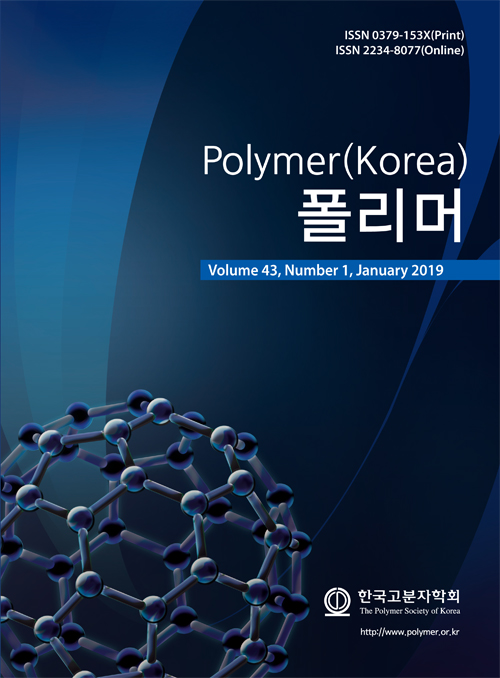- Thermal and Mechanical Properties of PET Copolymer Containing Bis(dimethyl hydroxyethyl) Tetraspiro Undecane
Seung-ho Jeong, Young Sil Lee, and Kwan Han Yoon†
Dept. of Chemical Engineering, Industry-Academic Cooperation Foundation, Kumoh National Institute of Technology, 1 Yangho-dong, Gumi 39177, Korea
- Bis(dimethyl hydroxyethyl) Tetraspiro Undecane을 함유하는 PET 공중합체의 열적 기계적 성질
정승호 · 이영실 · 윤관한†
금오공과대학교 화학공학과, 산학협력단
PET-BDHTU copolymers containing bis(dimethyl hydroxyethyl) tetraspiro undecane (BDHTU) were prepared with various BDHTU concentrations. The glass transition temperature of copolymer was increased from 70 ℃ for PET to 93 ℃ for PET-BDHTU copolymer containing 20 mol% of BDHTU. The heat deflection temperature was increased from 60 ℃ to 69 ℃ with the same BDHTU concentration. The impact strength was also increased from 8.4 J/m for PET to 13.2 J/m for PET-BDHTU copolymer containing 5 mol% of BDHTU. The effect of BDHTU on the Young's modulus was not observed, but the yield stress decreased from 66.3 MPa for PET to 21.9 MPa at 20 mol% loading of BDHTU. These resulted from the difficulty of the segmental motion of the main chain of the copolymer due to the bulky and rigid structure of tetraoxaspiro undecane of BDHTU. The optical transparency of copolymer was not changed with BDHTU concentration.
Bis(dimethyl hydroxyethyl) tetraspiro undecane(BDHTU)의 함량에 따라 PET-BDHTU 공중합체를 제조하였다. 공중합체의 유리전이온도는 BDHTU의 함량에 따라 증가하였고, BDHTU의 함량이 20 mol%일 때 93 ℃로 PET에 비해 23 ℃ 증가하였다. 열변형온도는 PET 값인 60 ℃에서 BDHTU의 함량이 20 mol%인 공중합체에서 69 ℃로 9 ℃ 증가하였다. 충격강도는 BDHTU 함량에 따라 증가하였고, PET 값인 8.4 J/m에서 BDHTU의 함량 5 mol%인 공중합체에서 13.2 J/m로 최고값을 보였다. BDHTU 첨가가 탄성률에는 영향을 보이지 않았지만 항복응력의 경우는 BDHTU 함량에 따라 PET의 66.3에서 21.9 MPa까지 감소하였다. 이는 BDHTU의 tetraoxaspiro undecane의 bulky하면서도 강직한 구조에 의해 공중합체의 주사슬의 분절운동이 힘들어지면서 나타난 결과로 보인다. BDHTU 함량에 따른 공중합체의 광투과율은 차이가 없었다.
Keywords: PET-BDHTU copolymer, bis(dimethyl hydroxyethyl) tetraspiro undecane, glass transition temperature, heat deflection temperature, transmittance
- Polymer(Korea) 폴리머
- Frequency : Bimonthly(odd)
ISSN 0379-153X(Print)
ISSN 2234-8077(Online)
Abbr. Polym. Korea - 2023 Impact Factor : 0.4
- Indexed in SCIE
 This Article
This Article
-
2019; 43(1): 10-16
Published online Jan 25, 2019
- 10.7317/pk.2019.43.1.10
- Received on Apr 25, 2018
- Revised on Jul 31, 2018
- Accepted on Aug 20, 2018
 Correspondence to
Correspondence to
- Kwan Han Yoon
-
Dept. of Chemical Engineering, Industry-Academic Cooperation Foundation, Kumoh National Institute of Technology, 1 Yangho-dong, Gumi 39177, Korea
- E-mail: khyoon@kumoh.ac.kr









 Copyright(c) The Polymer Society of Korea. All right reserved.
Copyright(c) The Polymer Society of Korea. All right reserved.